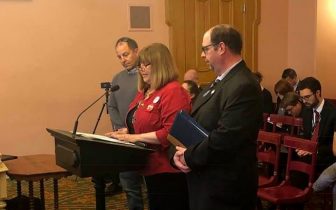A Seat at the Table or a Broken Promise?
OEA Blogger Julie Holderbaum, Minerva EA/OEA
Campaigning politicians often promise teachers a “seat at the table.” However, once the election is over, Ohio’s lawmakers have done too little to engage teachers in conversations about education policy.
Take, for example, the new graduation requirements passed into law via the state budget.
Many educators have been asking for a dialogue about graduation requirements for years now. Instead, legislators kept putting band-aids on the unrealistic requirements, rather than having a serious conversation with teachers about meaningful revisions.
This summer, the legislature ripped off the band-aid and passed into law what they call a permanent solution. Ohio Excels, a group primarily consisting of business leaders, created a new concoction of graduation requirements and the Ohio legislature gobbled it up.

The only education voices associated with the group seem to have been the Ohio 8 Coalition, an alliance of Ohio’s eight urban school districts. The large urban districts have unique needs and it makes sense for them to have joined together to address the challenges they face.
However, Ohio’s 612 public school districts are quite diverse, and the Ohio 8 represents only a small fraction of them, fewer than 1.3%.
The legislators who voted to accept the Ohio Excels plan have touted these new requirements, saying they reduce testing since only two Ohio state tests are required to graduate.
Don’t be fooled. There is no reduction in testing.
Kids who don’t pass the required tests the first time must retake them, and the other non-required state tests must still be offered since they are a way to prove “readiness” to graduate.
Real teaching and learning will be interrupted by test-taking and re-taking, just as it is now, and our curriculum must still focus on how to pass the state tests.
Under the new plan, high school seniors must show “competency” by earning certain scores, yet to be set, on the Algebra I and ELA II state tests. If they cannot earn the competency scores, which are being determined not by teachers, but by the Ohio Department of Higher Education and the Governor’s Office of Workforce Transformation, seniors have three additional options to show competency:
- they can earn proficient scores on the WorkKeys exam or earn other industry credentials — an option only truly available to kids who attend a vocational or career tech school;
- they can complete college coursework through the College Credit Plus program – an option most likely not realistic for kids who cannot earn passing scores on the state tests; or,
- they can enlist in the military.
Seniors show “readiness” by earning two additional “seals”, one of which is defined by the state and one of which can be locally designed and defined.
The locally defined seals will not be an obstacle for most students since they can be earned by participating in clubs, volunteering in the community, or demonstrating skill in the performing or fine arts.
The state-defined seals are much more daunting and most revolve around earning certain scores on tests — the ACT or SAT, AP or IB, the other state tests in American History, Government, or Biology; or, a very rigorous test in World Languages. There is only one other option to show readiness — join the military. Enlisting in the military is honorable and admirable, and it has been an excellent choice for many of my former students. However, it should be just that – a choice.

The timing of the state tests only exacerbates the problem.
In our district and many others, students must apply to the local career tech school by January of their sophomore year, so that the tech school has time to read applications and make program placements. However, students take the required ELA II state test for the first time in April of their sophomore year. Results are not available until late June.
I teach several juniors this year who are not going to the career tech school, and who found out this summer that they have not met the score requirements on the tests. They are now in the very dire situation of having no other choice but to join the military if they cannot raise those scores when they retake the test this year.
Not only did legislators overlook the fallout of their plan on Ohio’s students and their families, they failed to think about the mess schools are left to deal with by having THREE graduation plans in place. This year’s seniors can graduate under the band-aid plan passed last year, sophomores and juniors must meet the pre band-aid requirements, and the freshmen fall under the new plan. If older students can’t meet their requirements, they can try to meet the new ones.
Can you imagine explaining this convoluted mess to families, especially those with more than one child in high school?
The Ohio Excels motto, “Every Student, Every Day, Everybody’s Business,” is similar to my own school district’s motto, “Every Student, Every Minute, Every Day.”
In our motto, we don’t mention business because education is not a business and kids are not products moving along an assembly line. I suppose the Ohio legislature could justify accepting this business group’s plan by arguing that because graduates will enter the workforce in the near future, businesses should have some say in what kids should be able to do in order to earn a diploma. However, I would argue that educators who are working with kids in the immediate present should have an even louder voice in those decisions.

Perhaps the Ohio Excels motto means “everybody’s business” in the sense that a quality education of Ohio’s children is in the best interest of all citizens. If that’s true, the expertise of those working in the field of education should certainly count for something.
When legislators discuss educational policy at the table, shouldn’t our opinions be sought if for no other reason than to help point out the logistical problems with the proposed plan or to explain how the plan will affect real kids and their families?
Our input would allow them to see “teachers” and “students” not as mere words in an educational plan on paper, but as real people in real classrooms every day. Still, legislators fail to include teachers and principals in their decisions which affect education.
There is no college degree which qualifies legislators to know everything about the areas in which they make decisions, areas such as business, infrastructure, crime, the economy, healthcare, and public education.
Because we can’t expect legislators to know everything about the issues they legislate, we MUST expect them to listen to people with experience in those areas so that they can create realistic and beneficial policies. For example, seeking input from public school teachers could have saved the state from dealing with a plethora of messes, including the failure of the state school takeover law (HB 70), the debacle of the charter school industry, and the damage overtesting has done to our kids.
I’m tired of dealing with the fallout of poorly planned educational policies made with little to no input from those of us in the classroom.
When legislators don’t include teachers in decisions that impact our students, they are not only breaking promises to give us a seat at the table, they aren’t even inviting us to the meal. It’s time to crash the dinner party. And if we aren’t met with welcome, it’s time to quit begging for a seat at the table and instead take a stand at the polls.
— Julie Holderbaum is an English Instructor and an Academic Challenge Advisor at Minerva High School, Minerva, Ohio.
HB 154: Proponent Testimony – Becky Higgins
April 9, 2019

Good evening Chair Blessing, Ranking Member Robinson and members of the House Education Committee. On behalf of our 122,000 members, I am Becky Higgins, President of the Ohio Education Association.
I am here today to ask for your support for House Bill 154.
Also with me is Larry Ellis, the local president of the Youngstown Education Association and Jay Pickering, the local president of Lorain Education Association. Matt Dotson with OEA Government Relations is also here and can assist with any questions you may have.
As you might imagine, the fact that two former teachers are the bi-partisan joint sponsors of House Bill 154 is a big part of why we are strongly supportive of this bill.
These gentlemen, Representatives Jones and Miller, know first-hand what is needed to meet the challenges of providing a quality education in troubled school districts. And the current state takeover law is not getting the job done.
The state takeover and the resulting loss of local control in Youngstown, Lorain and East Cleveland schools has not helped the students in those districts.
If current law is not changed, over the next two years state government could take away local control from Dayton, Columbus, Canton, Mansfield, Lima, Toledo, Ashtabula, Euclid, North College Hill and Painesville schools.
It’s time for this to end. Let’s not do any more damage to other school districts.
We support House Bill 154 because it would do the following:
- Repeal the ill-conceived law that allows the state to takeover local school districts that are deemed to be in trouble.
- Restore local control to elected school boards.
- Hold school districts accountable by requiring school improvement teams in F-rated school buildings.
As my colleagues and our fellow OEA members in Youngstown and Lorain have experienced, the current state takeover law provides no citizen oversight through elected school boards, no voice for classroom teachers and has been bad for our kids.
Our experience in Youngstown and Lorain has demonstrated that the Academic Distress Commission/CEO model does not work. We believe that no more districts should be taken over, and that the districts that have been taken over should be relieved of that burden. That is why the first part of House Bill 154 is so important – repeal.
It is also important to note that state takeovers are based on misleading state report cards that severely penalize students and districts in poverty.
After the failed state takeover law is repealed and local control is restored, OEA stands ready to partner with the House Education Committee to fix Ohio’s broken and deceptive report card system.
Thank you for this opportunity to testify in support of House Bill 154.
We are available for any questions you may have.
Statewide Call: Lorain Academic Distress Commission Mtg
This is an all-call upon every member who can and will, to join their brothers and sisters in Lorain for a strong showing of solidarity.
The Lorain Academic Distress Commission (ADC) will meet 5 p.m. Tuesday, March 19, 2019, at General Johnnie Wilson Middle School, 2700 Washington Ave., Lorain, OH 44052.
The Lorain state takeover is NOT working for the school district, its educators, or the students we care about.
This is the first meeting with the newly appointed ADC chair, Randall Sampson.
 This is an important opportunity for us to get directly in front of the Commission! As educators, we need to show we mean it when we say HB70 is nothing more than an attack on public education and labor rights. Accordingly, the Lorain state takeover is NOT working for the school district, its educators, or the students we care about.
This is an important opportunity for us to get directly in front of the Commission! As educators, we need to show we mean it when we say HB70 is nothing more than an attack on public education and labor rights. Accordingly, the Lorain state takeover is NOT working for the school district, its educators, or the students we care about.
It’s important that YOU join us in solidarity with Lorain City Mayor Chase Ritenauer, who has called on all city police and fire that aren’t on duty that night to attend as well as other local and statewide unions.
Moreover, ADC needs to hear it from YOU that Lorain’s citizens want to be in control of their own school district.
With the public nature of the disastrous Lorain High School plan, education-friendly state legislators will soon introduce Repeal and Replace HB70 legislation.
It is important that we all join this fight now for our students, our rights, and the future of public education. | #OverTestedOH
Former OEA Members Working to Dismantle State Takeover Law
State Representatives Joseph A. Miller III (D-Amherst) and Don Jones (R-Freeport) recently announced they will soon introduce bipartisan legislation to repeal portions of House Bill 70 — the state takeover bill.
Rep. Miller, who taught social studies at Firelands High School — and a member of Firelands E.A. / OEA — before being elected to the Ohio House, said the proposal would dissolve the Academic Distress Commissions that have “been unable to work effectively alongside the district’s teachers, school leaders and community.” He also added the proposed legislation would “give struggling schools the support they need to succeed.”
“The Academic Distress Commissions have been unable to work effectively alongside the district’s teachers…”
Rep. Jones, the pending legislation’s co-sponsor, is also an educator. Before being elected to the Ohio House, Jones was an agricultural education teacher and FFA∗ advisor at Harrison Central High School — and a member of the Harrison Hill T.A./OEA — for 23 years. In the statement announcing the proposed legislation, Jones said that Ohio schools “need more local control — not less.”
Ohio schools “need more local control — not less.”
The 2015 legislation currently requires the state superintendent to intervene via “Academic Distress Commissions” for any school district declared to be in “Academic Emergency.” Placed under state-control, the commission assumes the decision-making authority of the locally-elected school board. It also hires a CEO with broad powers to run the district, overruling the local school board’s appointed superintendent.
Miller and Jones are currently seeking additional legislative sponsors and are expected to introduce a formal bill soon. Their initiative has the support of the OEA.
∗Future Farmers of America
Related Stories
- State Takeover: OEA Comment to the Ohio State Board of Education | By Scott DiMauro, OEA Vice President
- 03.13.2019 | Columbus Dispatch: Legislators show growing opposition to state takeovers
- 03.13.2019 | Despite critique from business leaders, state school broadens road to diploma


